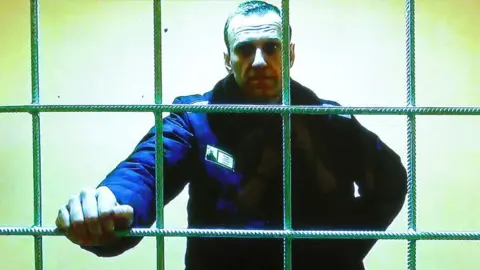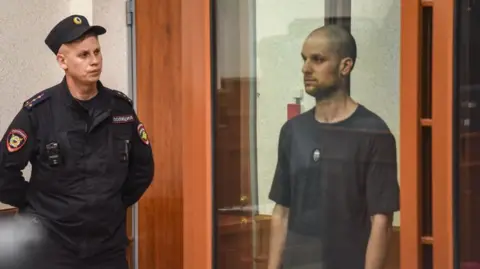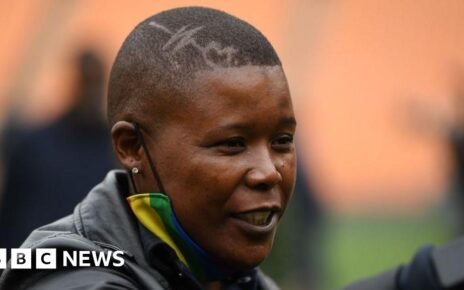[ad_1]
 Getty Images
Getty Images“This is a matter best dealt with in silence.”
It’s the phrase of choice of Russian officials when asked to comment on possible East-West prisoner exchanges. Words we’ve been hearing for months.
This is how the Kremlin likes it: deal-making behind closed doors, “hostage diplomacy” far from the media spotlight. Intelligence service talking to intelligence service; government to government.
Until Moscow gets what – or rather whom – it wants.
But despite the “silence”, there were signals. Something was moving.
In an interview with former Fox News host Tucker Carlson last February, Vladimir Putin spoke about Evan Gershkovich, the Wall Street Journal reporter who had been arrested in Russia and charged with espionage.
“I do not rule out that Mr Gershkovich may return to his homeland,” Mr Putin said. “We want the US special services to think about how they can contribute to achieving the goals our special services are pursuing.”
It was a very public and unsubtle hint: Moscow was open to doing a deal.
The Kremlin leader didn’t name names. But he made it quite clear whom Russia wanted in return: Vadim Krasikov, the suspected Russian agent who was serving a life sentence for murder – not in America, but in Germany.
A few days later, Russian opposition leader Alexei Navalny died in a remote Arctic penal colony. Rumours swirled that before his death, talks had been under way on exchanging Mr Navalny, Evan Gershkovich and former US marine Paul Whelan, all jailed in Russia, for Vadim Krasikov in Germany.
Had the German authorities entered negotiations on a prisoner swap?
 Reuters
ReutersFast forward to June. Evan Gershkovich’s closed-door spy trial – dismissed as a “sham” by the Wall Street Journal and the US government – finally began in Yekaterinburg. The case was quickly adjourned until mid-August.
But last month, the court unexpectedly brought the second hearing forward by more than three weeks. At the end of a lightning-fast three-day trial, Evan Gershkovich was convicted and sentenced to 16 years in a penal colony.
The very same day, US-Russian journalist Alsu Kurmasheva was sentenced to six-and-a-half years in prison by a court in Kazan. Her trial had lasted just two days.
Someone was clearly in a hurry. It was the strongest sign yet that a deal had been done, that a swap was likely. The Russian authorities normally treat a conviction as a prerequisite for any prisoner exchange.
Earlier this week – more signals, with reports that a string of prominent Russian political prisoners had been moved from their penal colonies or detention centres.
Speculation grew. Might these dissidents be part of a larger prisoner exchange than had originally been anticipated?
 EPA
EPANews broke in Belarus: the country’s leader, Alexander Lukashenko, had agreed to pardon Rico Krieger, a German citizen sentenced to death on terrorism and other charges. Could he be part of a swap?
This is the largest East-West prisoner exchange since the Cold War.
Western governments will welcome the release of foreigners, as well as freedom for some of Russia’s most prominent political prisoners.
Moscow will celebrate the return of its agents.
Both sides will claim it’s a good deal.
But if Russia concludes, as it has done in the past, that “hostage diplomacy” works, then worryingly, this is unlikely to be the last time that prisoners here – both foreigners and Russians – are used as bargaining chips.
[ad_2]
Source link freeslots dinogame telegram营销




